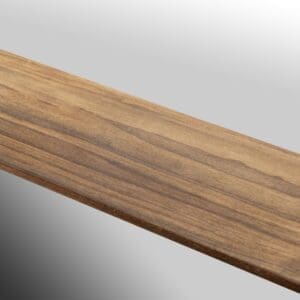By Anna Eyler
Circular business practices revolutionize industries, mitigate environmental impact, minimize waste generation, achieve cost reductions, and drive sustainable innovation for a brighter future. In a circular economy, materials and products are utilized for their maximum lifespan. Cutting-edge innovations from companies like InventWood and Quantum Loophole are shining examples of how local ingenuity will have global impacts on best circular practices.
InventWood

The production of concrete, steel and aluminum — primarily used for building projects — accounts for a whopping 20% of annual global greenhouse gas (GHG) emissions. The building materials industry is well past due for a major innovation in sustainable practices. That’s where InventWood comes in.
Our Base Camp member, InventWood, is revolutionizing the industry with their carbon-sequestering biomaterial MettleWood. It has the potential to replace up to 80% of the world’s steel and concrete, which would reduce global GHG emissions by over two gigatons. Compared to A36 steel, MettleWood is less expensive, 50% stronger, six times lighter.
How it’s made
MettleWood can be created from almost any type of tree, including abundant, affordable, fast-growing and even invasive species. Logs are trimmed and cut into planks before being processed using InventWood’s proprietary Lignin Modification method. Then, it is physically compressed to allow the cellulose fibers in the wood to align more closely. The compressed board is resized, polished and sealed. The result is 20 times stronger and 15 times stiffer than raw wood.
Dr. Liangbing Hu, founder of InventWood says on their website, “Wood is abundant and relatively low-cost—it literally grows on trees. And although it has been used for millennia to build everything from furniture to homes and larger structures, untreated wood is rarely as strong as metals used in construction. MettleWood is stronger, lighter, and aesthetically superior when compared to steel. It’s effortlessly easy for the construction industry to embrace our solution.”
This extremely durable and 100% biodegradable material is the future of construction. It is capable of a Class A fire rating, which will be a first for a 100% wood product. It is also highly resistant to moisture, fungus, termites, scratching, and denting. InventWood is developing additional technologies to disrupt other industries, including transportation, electronics and packaging.
By harnessing natural materials and applying scientific advancements to improve them, InventWood showcases how innovative solutions grounded in circular principles can pave the way towards a greener future.
Quantum Loophole

Data centers — facilities that house networks of computers that process, store and share data — are key to building and maintaining a connected future. However, these centers traditionally use large amounts of electricity, water, and land – raising concerns for the future of our planet. Quantum Loophole is revolutionizing how data centers are built and run to mitigate environmental harm.
CEO Josh Snowhorn remarks that, “Quantum Loophole was founded because the future of the Internet endangered the future of the planet. We’re creating a new reality for them both by selecting data center sites where we can become stewards to land and natural resources, maximizing environmental benefits for communities, workers, and nature.”
More than 600 acres of Quantum Frederick land is being set aside to create a Nature Reserve. It will be a certified and registered carbon sink, locally capturing CO2 produced by the data center. When development is finished, there will be a forest of one million trees, which will store nearly 2,800 tons of carbon each year, as well as improve air and water quality and buffer sound from the center.
The land is considered a ‘brownfield,’ which is a former industrial or commercial site with a history of pollutants or contaminants. Alcoa Eastalco Works operated an aluminum smelting plant on the site for over 35 years. Quantum Frederick is restoring the health of the soil by planting local flora. Furthermore, unlike traditional data centers that heavily rely on local water sources for cooling, Quantum Loophole is pioneering sustainable practices by utilizing recycled grey water.
Data centers are essential for modern communication, commerce, research, and innovation. The connected world we have created could not function without them. However, we must ensure that our use of them does not jeopardize the health of our planet, and Quantum Loophole is showing the world how it should be done.
FITCI
The Frederick Innovative Technology Center is committed to encouraging technological innovation, especially in ways that help people live healthier lives, protect our shared natural resources, and uncover pathways to greater sustainability. These are just two of the clients and partners who are leading the way to a brighter future while developing the commercially viable businesses that are integral to Frederick’s livability and economic vitality. Want to be part of the solution? Call 301-694-2999 or write to info@fitci.org to find out more about becoming part of this community or how you can support the efforts of today’s most innovative emerging entrepreneurs.

